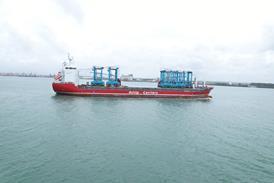Delegates at the International Maritime Organization's (IMO) 72nd Marine Environment Protection Committee (MEPC 72) have agreed on a greenhouse gas (GHG) reduction strategy for the international shipping industry.
The strategy outlines a target to reduce GHG emissions by at least 50 percent by 2050 compared to 2008 while pursuing efforts towards phasing them out.
The International Chamber of Shipping (ICS) has welcomed the high level strategy. "This is a ground breaking agreement - a Paris Agreement for shipping - that sets a very high level of ambition for the future reduction of CO2 emissions," said ICS secretary general, Peter Hinchliffe.
"We are confident this will give the shipping industry the clear signal it needs to get on with the job of developing zero CO2 fuels, so that the entire sector will be in a position to decarbonise completely, consistent with the 1.5 degree climate change goal."
ICS acknowledges that some governments would have preferred to see the adoption of even more aggressive targets, but argues that a 50 percent total cut by 2050 can realistically only be achieved with the development and very widespread use of zero CO2 fuels.
ICS believes that if this 50 percent goal is successfully met, the wholesale switch by the industry to zero CO2 fuels should therefore follow very swiftly afterwards.
The Baltic and International Maritime Council (BIMCO) has also praised the strategy, describing the target as ambitious, but not impossible. Lars Robert Pedersen, BIMCO deputy secretary general and delegate at the IMO meeting, said: "The IMO has done something no one has done before: set an absolute target for emission reductions for an entire industry.
"It is a landmark achievement in the effort to reduce emissions, and something that every other industry should look to for inspiration."
BIMCO sees zero carbon emissions as a realistic goal for the second half of this century, but investments in research and technology are required to get there.
According to ICS, the efficiency goal that has been agreed by IMO Member States for the sector includes a 40 percent improvement by 2030, compared to 2008, and a 50-70 percent improvement by 2050.
The organisation hopes that the IMO agreement will be sufficient to discourage those who advocate regional measures, which ICS claims would not be effective in helping the international shipping sector to further reduce its total CO2 emissions.
















